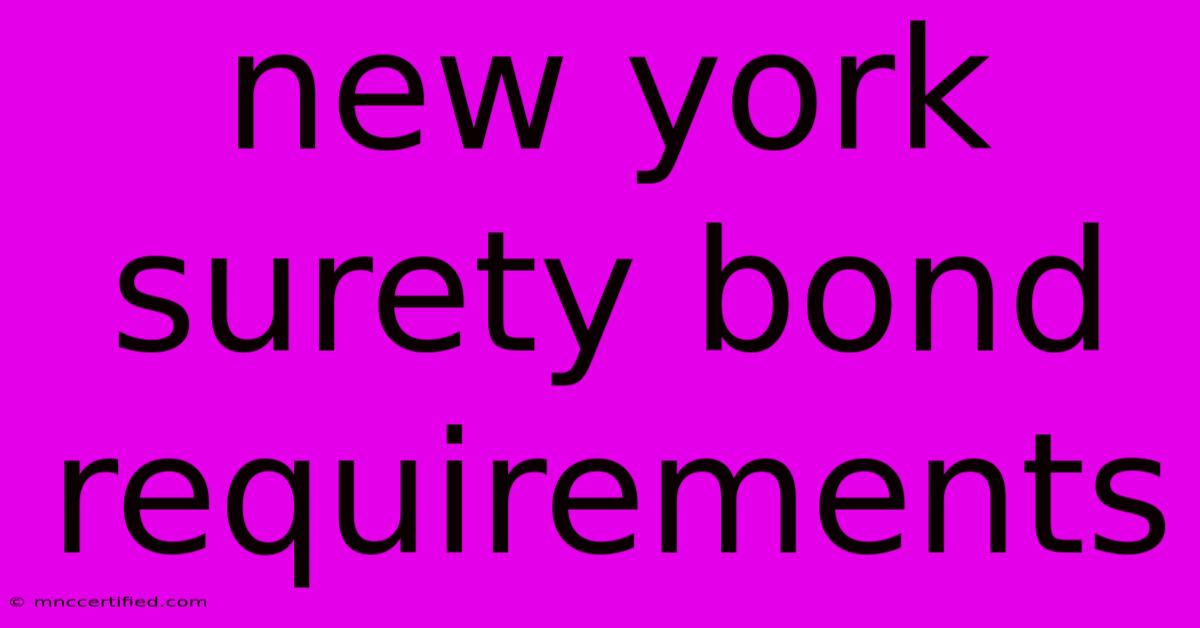New York Surety Bond Requirements

Table of Contents
New York Surety Bond Requirements: A Comprehensive Guide
Navigating the world of surety bonds in New York can be complex. This guide breaks down the requirements, helping you understand what you need to know to obtain the right bond for your specific needs. We'll cover the basics, common types of bonds, and crucial factors to consider when applying.
Understanding Surety Bonds in New York
A surety bond in New York, like in other states, isn't insurance. It's a three-party agreement involving:
- The Principal: The individual or business needing the bond.
- The Obligee: The entity requiring the bond (e.g., a government agency or private client).
- The Surety: The bonding company guaranteeing the Principal's performance.
The bond protects the obligee from financial loss if the principal fails to meet their contractual obligations. If the principal defaults, the surety pays the claim up to the bond amount. The principal is then responsible for reimbursing the surety.
Common Types of Surety Bonds in New York
New York requires surety bonds for various professions and activities. Some of the most common include:
1. Contractor License Bonds:
Contractors in New York often need surety bonds to obtain and maintain their licenses. The amount varies depending on the type of contracting work and the licensing authority (e.g., Home Improvement Contractor, General Contractor, Specialty Contractor). These bonds ensure contractors fulfill their contractual obligations and protect homeowners and clients from financial losses due to contractor negligence or default. Requirements for these bonds often include financial statements and a good credit history.
2. Court Bonds:
These bonds secure various legal proceedings. Examples include:
- Fiduciary Bonds: Required for individuals managing estates or trusts. The bond amount is determined by the value of the assets being managed.
- Bail Bonds: Secure the release of an arrested individual awaiting trial. These are handled by bail bondsmen and have specific requirements.
- Injunction Bonds: Required when seeking a court order to restrain someone from taking certain actions.
3. Public Official Bonds:
Many public officials in New York are required to post surety bonds to guarantee honest and ethical conduct in their official duties. The specific requirements depend on the position held.
4. License and Permit Bonds:
Several professions and businesses in New York require surety bonds for licensing or permitting. These bonds ensure compliance with regulations and protect the public interest. Examples include bonds for:
- Auctioneers
- Motor Vehicle Dealers
- Private Investigators
Key Factors Affecting New York Surety Bond Requirements
Several factors influence the requirements for surety bonds in New York:
- Bond Amount: This is the maximum amount the surety will pay in case of a claim. It's determined by the obligee's risk assessment.
- Credit Score: A good credit history is crucial for obtaining a surety bond. A higher credit score usually leads to lower premiums.
- Financial Statements: Surety companies will review your financial statements to assess your ability to repay the surety if a claim is made.
- Business Experience: Your experience in the relevant field will influence the surety's risk assessment.
- Type of Bond: Different bonds have varying requirements. A contractor's license bond will have different requirements than a fiduciary bond.
How to Obtain a Surety Bond in New York
- Identify the Required Bond: Determine the specific type of bond required for your situation.
- Find a Surety Bond Company: Research and compare different surety companies to find the best rates and terms.
- Complete the Application: Provide all necessary documentation, including financial statements and personal information.
- Underwriting Process: The surety company will review your application and assess your risk.
- Bond Issuance: Once approved, the surety company will issue the bond.
Finding the Right Surety Bond for Your Needs
Obtaining the correct surety bond is crucial for compliance and protecting your interests. Understanding the specific requirements based on your situation is essential. Consulting with a surety bond professional can help navigate the complexities and ensure you obtain the right bond for your needs. They can help you understand the intricacies of New York's regulations and find the most suitable and cost-effective solution. Remember, always verify requirements with the relevant licensing board or agency.
This article provides general information and should not be considered legal advice. Always consult with legal professionals for specific guidance on New York surety bond requirements.

Thank you for visiting our website wich cover about New York Surety Bond Requirements. We hope the information provided has been useful to you. Feel free to contact us if you have any questions or need further assistance. See you next time and dont miss to bookmark.
Featured Posts
-
Outrage Glastonburys Ticket Queue Fails
Nov 18, 2024
-
Tulisa Contostavlos Ethnicity Real Name
Nov 18, 2024
-
Luke Littler Wins 2024 Grand Slam
Nov 18, 2024
-
Packers Beat Bears 20 19 Nov 17 2024
Nov 18, 2024
-
Rams Edge Out Patriots In Close Contest
Nov 18, 2024